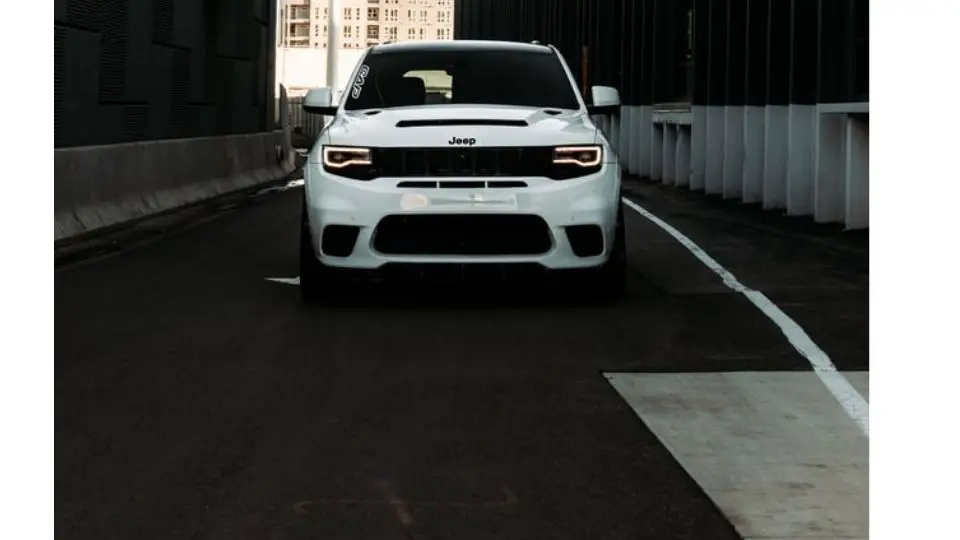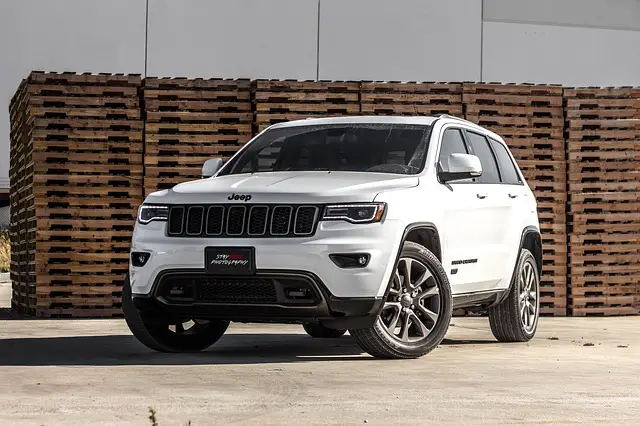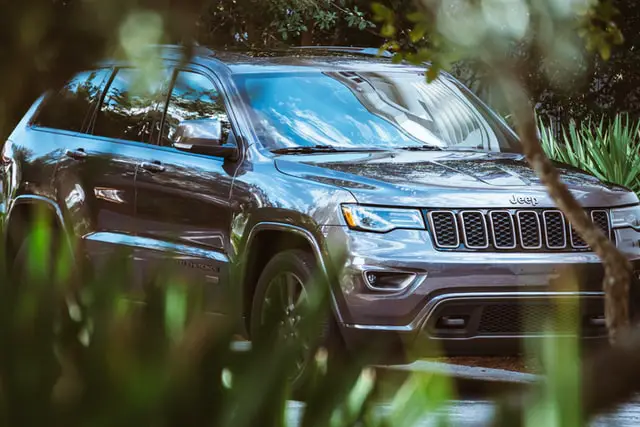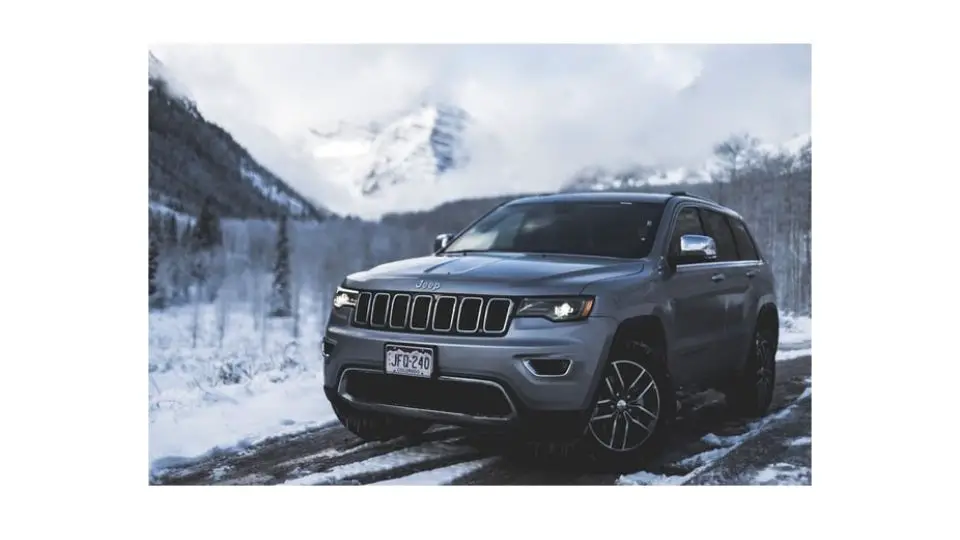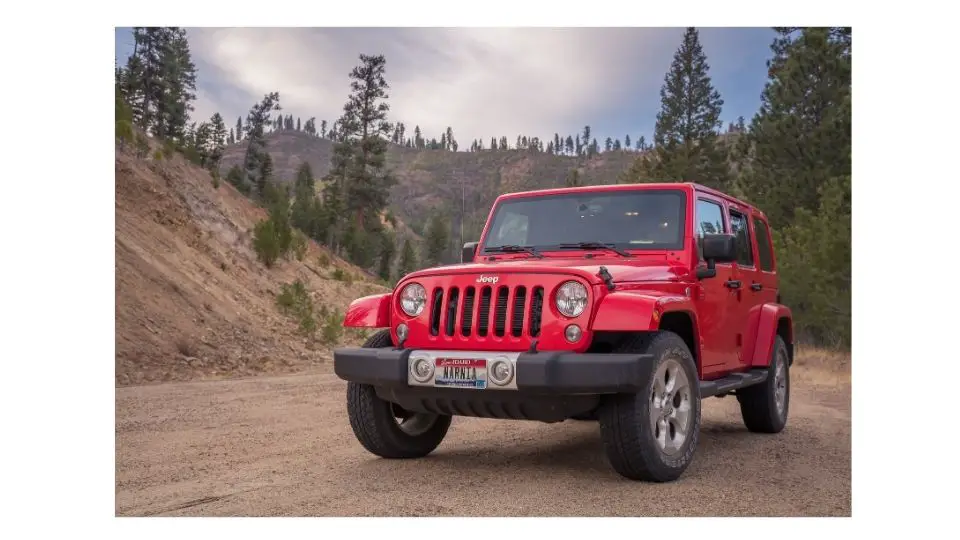A Jeep Grand Cherokee is designed for off-road use and will therefore have a stiffer suspension than most sedans. This rigidity may be exacerbated by the excessive weight of the vehicle when full of cargo and passengers.
It may also be simply due to bad tires. There are many possible reasons for this shaking, but no easy solution without having more information about what exactly you are experiencing with your vehicle beyond “it’s shaking”.
In this article, I am going to share with you possible reasons why your jeep grand Cherokee is shaking So, do not spend time trying to fix problems that you do not understand until you get more information on what causes your Jeep to shake.
Here are some of the common reasons you might find that cause shaking in your vehicle:
why is my jeep grand Cherokee shaking?
Loose wheel bearings:
Loose wheel bearings can make a Jeep shake at higher speeds. Also, loose wheel bearings can get worse over time and cause your Jeep to shake at low speeds as well. If you suspect that this is the problem, make sure all of the wheel bearings are tightened to specifications and in good condition.
Loose steering components:
Loose tie rods, loose steering box, and other components in your vehicle can also make it shake at higher speeds or when you take your foot off of the gas pedal. Make sure that all of your steering components are tight and properly lubricated for better performance.
Worn out shocks:
If you find that your Jeep shakes under heavy acceleration or after a bumpy ride, then it might be time to replace some parts on the suspension system such as shocks and hoses.
Leaking shocks:
If you find that your Jeep is shaking a lot after you have hit a bumpy patch on the street or on the driveway, then there might be some leaks in your shocks. You may need to replace them.
Misaligned tires:
Most transmissions have a range in which they work best in terms of acceleration and top speed. When you are doing over or under that range, you will notice your Jeep shaking.
For example, if your Jeep is misaligned, it will not take off well at higher speeds and might also shake at lower speeds than normal as well. Alignment issues will make your tires wear unevenly and this could cause a shake in any vehicle including a Jeep Grand Cherokee.
The steering gear:
If you check the alignment of your steering gear or tie rods, and they are drastically misaligned, then this could be causing your Jeep to shake at higher speeds or when you use it on a bumpy road.
Worn out hydraulics:
If the automatic transmission in your Jeep is leaking fluid due to worn-out components, then there will be more shacking when you are driving over bumps. In addition to this, it will also cause looser dirt roads when being driven on them. If this is the case with your vehicle, a rebuild of the transmission might be needed as well.
Mechanical problems:
Any type of mechanical problem in your Jeep Grand Cherokee can cause it to shake at higher speeds. In this case, you should check the brakes and the battery for possible issues.
You should also check all the fluids in your car to make sure they are not leaking or low. The same thing goes for your oil levels. Lastly, you might want to check if there is any damage to your engine.
Front suspension tie rod issue:
A front suspension tie rod issue can cause a shaking when you drive over bumps or when driving at high speeds as well. In this case, you may need to replace one or both of them depending on how much they are damaged.
First, inspect the tires for damage and under-inflation. This can be done by checking the wear on any edges of the tires that may come in contact with a curb or pothole or by simply checking the pressure. Check all 4 tires, not just two as you may have done if you just noticed two were under-inflated and over-inflated two others.
Next, I would check for alignment issues. If the vehicle is shifting or pulling to one side, adjust the wheels for a straight alignment. If the driver-side wheel shifts more than the other side, that may indicate a steering issue.
If there is a significant pull to one side (you can actually feel it) but not as much as you describe on a scale of 1-10, then I would look at the axle/steering box that controls drive-shaft alignment. Typically these are located in front of the transmission case where heavy components would press on them and cause them to twist and bend.
If you have found any bent or twisted parts, replace with a new part and resolve this issue now before it progresses in time to become more than just minor shaking.
If after checking these components you find no issue, I would check for fluid leaks. Any of the components mentioned could leak fluid.
A leaking shock absorber can cause a bumpy ride, but a leaking slave cylinder can cause CVT-related shift loss and/or a very rough ride. Also, check the steering components for fluid leaks and for cracks in the mechanisms that control manual and automatic shifting.
Finally, I would try to replicate your symptoms by driving at different speeds and positions on the road. If you notice shaking at moderate speeds as described above with your vehicle at rest or driving up an incline, that may be due to suspension issues or just bad tires.
What causes a jeep to shake while driving?
if you drive fast or at high speeds and the jeep is shaking, then most likely it is a tire that needs to be replaced. If you are driving at low speeds and it starts shaking, then that could mean your suspension is not working correctly or you may need a new disc for your brakes.
How do I fix the jeep Grand Cherokee when it starts shaking?
If the jeep shakes when you start to accelerate, then your tires may have low air pressure. Check your tires and make sure they are in good condition before driving again.
If the tires are fine, check your transmission fluid level because you might be low on oil. If your Jeep is still shaking when you take your foot off the gas, it means that something is wrong with the transmission. The transmission is a complex unit and has many moving parts. Over time, all of the moving parts might wear out and start to malfunction. This would be a common problem.
If your Jeep is just shaking because of a bad suspension system, then you should have the suspension repaired or replaced right away. Also, check for leaks in your tube or hose that connects the shocks to the chassis and has fluid coming out. If this is the case, then you need to replace your shocks and hoses.
If the steering box is responsible for your Jeep shaking, then you should have the steering box checked and replaced if needed.
Make sure that all of your electrical connections are tight and in working order since these might be causing problems with your Jeep’s suspension and steering as well.
If there is excess play in the wheel bearings, steering gear, or tie rods replace them with new ones right away. Also check your alignment to make sure it is not way off center. Alignment issues will cause a Jeep to shake at higher speeds as well as looser dirt roads.
is it safe to drive a shaking jeep?
It is always safe to drive a Jeep even if the vehicle is shaking. However, it is not advisable to drive around with a shaking vehicle for too long if you do not know the cause of it. There are many things that could be causing your Jeep to shake. The cause could be minor and easily fixed, or it could also be serious and would lead to a breakdown down the road.
A Jeep Grand Cherokee is designed for off-road use and will therefore have a stiffer suspension than most sedans. This rigidity may be exacerbated by the excessive weight of the vehicle when full of cargo and passengers.
It may also be simply due to bad tires. There are many possible reasons for this shaking, but no easy solution without having more information about what exactly you are experiencing with your vehicle beyond “it’s shaking”.
In this article, I am going to share with you possible reasons why your jeep grand Cherokee is shaking So, do not spend time trying to fix problems that you do not understand until you get more information on what causes your Jeep to shake.
Here are some of the common reasons you might find that cause shaking in your vehicle:
why is my jeep grand Cherokee shaking?
Loose wheel bearings:
Loose wheel bearings can make a Jeep shake at higher speeds. Also, loose wheel bearings can get worse over time and cause your Jeep to shake at low speeds as well. If you suspect that this is the problem, make sure all of the wheel bearings are tightened to specifications and in good condition.
Loose steering components:
Loose tie rods, loose steering box, and other components in your vehicle can also make it shake at higher speeds or when you take your foot off of the gas pedal. Make sure that all of your steering components are tight and properly lubricated for better performance.
Worn out shocks:
If you find that your Jeep shakes under heavy acceleration or after a bumpy ride, then it might be time to replace some parts on the suspension system such as shocks and hoses.
Leaking shocks:
If you find that your Jeep is shaking a lot after you have hit a bumpy patch on the street or on the driveway, then there might be some leaks in your shocks. You may need to replace them.
Misaligned tires:
Most transmissions have a range in which they work best in terms of acceleration and top speed. When you are doing over or under that range, you will notice your Jeep shaking.
For example, if your Jeep is misaligned, it will not take off well at higher speeds and might also shake at lower speeds than normal as well. Alignment issues will make your tires wear unevenly and this could cause a shake in any vehicle including a Jeep Grand Cherokee.
The steering gear:
If you check the alignment of your steering gear or tie rods, and they are drastically misaligned, then this could be causing your Jeep to shake at higher speeds or when you use it on a bumpy road.
Worn out hydraulics:
If the automatic transmission in your Jeep is leaking fluid due to worn-out components, then there will be more shacking when you are driving over bumps. In addition to this, it will also cause looser dirt roads when being driven on them. If this is the case with your vehicle, a rebuild of the transmission might be needed as well.
Mechanical problems:
Any type of mechanical problem in your Jeep Grand Cherokee can cause it to shake at higher speeds. In this case, you should check the brakes and the battery for possible issues.
You should also check all the fluids in your car to make sure they are not leaking or low. The same thing goes for your oil levels. Lastly, you might want to check if there is any damage to your engine.
Front suspension tie rod issue:
A front suspension tie rod issue can cause a shaking when you drive over bumps or when driving at high speeds as well. In this case, you may need to replace one or both of them depending on how much they are damaged.
First, inspect the tires for damage and under-inflation. This can be done by checking the wear on any edges of the tires that may come in contact with a curb or pothole or by simply checking the pressure. Check all 4 tires, not just two as you may have done if you just noticed two were under-inflated and over-inflated two others.
Next, I would check for alignment issues. If the vehicle is shifting or pulling to one side, adjust the wheels for a straight alignment. If the driver-side wheel shifts more than the other side, that may indicate a steering issue.
If there is a significant pull to one side (you can actually feel it) but not as much as you describe on a scale of 1-10, then I would look at the axle/steering box that controls drive-shaft alignment. Typically these are located in front of the transmission case where heavy components would press on them and cause them to twist and bend.
If you have found any bent or twisted parts, replace with a new part and resolve this issue now before it progresses in time to become more than just minor shaking.
If after checking these components you find no issue, I would check for fluid leaks. Any of the components mentioned could leak fluid.
A leaking shock absorber can cause a bumpy ride, but a leaking slave cylinder can cause CVT-related shift loss and/or a very rough ride. Also, check the steering components for fluid leaks and for cracks in the mechanisms that control manual and automatic shifting.
Finally, I would try to replicate your symptoms by driving at different speeds and positions on the road. If you notice shaking at moderate speeds as described above with your vehicle at rest or driving up an incline, that may be due to suspension issues or just bad tires.
What causes a jeep to shake while driving?
if you drive fast or at high speeds and the jeep is shaking, then most likely it is a tire that needs to be replaced. If you are driving at low speeds and it starts shaking, then that could mean your suspension is not working correctly or you may need a new disc for your brakes.
How do I fix the jeep Grand Cherokee when it starts shaking?
If the jeep shakes when you start to accelerate, then your tires may have low air pressure. Check your tires and make sure they are in good condition before driving again.
If the tires are fine, check your transmission fluid level because you might be low on oil. If your Jeep is still shaking when you take your foot off the gas, it means that something is wrong with the transmission. The transmission is a complex unit and has many moving parts. Over time, all of the moving parts might wear out and start to malfunction. This would be a common problem.
If your Jeep is just shaking because of a bad suspension system, then you should have the suspension repaired or replaced right away. Also, check for leaks in your tube or hose that connects the shocks to the chassis and has fluid coming out. If this is the case, then you need to replace your shocks and hoses.
If the steering box is responsible for your Jeep shaking, then you should have the steering box checked and replaced if needed.
Make sure that all of your electrical connections are tight and in working order since these might be causing problems with your Jeep’s suspension and steering as well.
If there is excess play in the wheel bearings, steering gear, or tie rods replace them with new ones right away. Also check your alignment to make sure it is not way off center. Alignment issues will cause a Jeep to shake at higher speeds as well as looser dirt roads.
is it safe to drive a shaking jeep?
It is always safe to drive a Jeep even if the vehicle is shaking. However, it is not advisable to drive around with a shaking vehicle for too long if you do not know the cause of it. There are many things that could be causing your Jeep to shake. The cause could be minor and easily fixed, or it could also be serious and would lead to a breakdown down the road.
A Jeep Grand Cherokee is designed for off-road use and will therefore have a stiffer suspension than most sedans. This rigidity may be exacerbated by the excessive weight of the vehicle when full of cargo and passengers.
It may also be simply due to bad tires. There are many possible reasons for this shaking, but no easy solution without having more information about what exactly you are experiencing with your vehicle beyond “it’s shaking”.
In this article, I am going to share with you possible reasons why your jeep grand Cherokee is shaking So, do not spend time trying to fix problems that you do not understand until you get more information on what causes your Jeep to shake.
Here are some of the common reasons you might find that cause shaking in your vehicle:
why is my jeep grand Cherokee shaking?
Loose wheel bearings:
Loose wheel bearings can make a Jeep shake at higher speeds. Also, loose wheel bearings can get worse over time and cause your Jeep to shake at low speeds as well. If you suspect that this is the problem, make sure all of the wheel bearings are tightened to specifications and in good condition.
Loose steering components:
Loose tie rods, loose steering box, and other components in your vehicle can also make it shake at higher speeds or when you take your foot off of the gas pedal. Make sure that all of your steering components are tight and properly lubricated for better performance.
Worn out shocks:
If you find that your Jeep shakes under heavy acceleration or after a bumpy ride, then it might be time to replace some parts on the suspension system such as shocks and hoses.
Leaking shocks:
If you find that your Jeep is shaking a lot after you have hit a bumpy patch on the street or on the driveway, then there might be some leaks in your shocks. You may need to replace them.
Misaligned tires:
Most transmissions have a range in which they work best in terms of acceleration and top speed. When you are doing over or under that range, you will notice your Jeep shaking.
For example, if your Jeep is misaligned, it will not take off well at higher speeds and might also shake at lower speeds than normal as well. Alignment issues will make your tires wear unevenly and this could cause a shake in any vehicle including a Jeep Grand Cherokee.
The steering gear:
If you check the alignment of your steering gear or tie rods, and they are drastically misaligned, then this could be causing your Jeep to shake at higher speeds or when you use it on a bumpy road.
Worn out hydraulics:
If the automatic transmission in your Jeep is leaking fluid due to worn-out components, then there will be more shacking when you are driving over bumps. In addition to this, it will also cause looser dirt roads when being driven on them. If this is the case with your vehicle, a rebuild of the transmission might be needed as well.
Mechanical problems:
Any type of mechanical problem in your Jeep Grand Cherokee can cause it to shake at higher speeds. In this case, you should check the brakes and the battery for possible issues.
You should also check all the fluids in your car to make sure they are not leaking or low. The same thing goes for your oil levels. Lastly, you might want to check if there is any damage to your engine.
Front suspension tie rod issue:
A front suspension tie rod issue can cause a shaking when you drive over bumps or when driving at high speeds as well. In this case, you may need to replace one or both of them depending on how much they are damaged.
First, inspect the tires for damage and under-inflation. This can be done by checking the wear on any edges of the tires that may come in contact with a curb or pothole or by simply checking the pressure. Check all 4 tires, not just two as you may have done if you just noticed two were under-inflated and over-inflated two others.
Next, I would check for alignment issues. If the vehicle is shifting or pulling to one side, adjust the wheels for a straight alignment. If the driver-side wheel shifts more than the other side, that may indicate a steering issue.
If there is a significant pull to one side (you can actually feel it) but not as much as you describe on a scale of 1-10, then I would look at the axle/steering box that controls drive-shaft alignment. Typically these are located in front of the transmission case where heavy components would press on them and cause them to twist and bend.
If you have found any bent or twisted parts, replace with a new part and resolve this issue now before it progresses in time to become more than just minor shaking.
If after checking these components you find no issue, I would check for fluid leaks. Any of the components mentioned could leak fluid.
A leaking shock absorber can cause a bumpy ride, but a leaking slave cylinder can cause CVT-related shift loss and/or a very rough ride. Also, check the steering components for fluid leaks and for cracks in the mechanisms that control manual and automatic shifting.
Finally, I would try to replicate your symptoms by driving at different speeds and positions on the road. If you notice shaking at moderate speeds as described above with your vehicle at rest or driving up an incline, that may be due to suspension issues or just bad tires.
What causes a jeep to shake while driving?
if you drive fast or at high speeds and the jeep is shaking, then most likely it is a tire that needs to be replaced. If you are driving at low speeds and it starts shaking, then that could mean your suspension is not working correctly or you may need a new disc for your brakes.
How do I fix the jeep Grand Cherokee when it starts shaking?
If the jeep shakes when you start to accelerate, then your tires may have low air pressure. Check your tires and make sure they are in good condition before driving again.
If the tires are fine, check your transmission fluid level because you might be low on oil. If your Jeep is still shaking when you take your foot off the gas, it means that something is wrong with the transmission. The transmission is a complex unit and has many moving parts. Over time, all of the moving parts might wear out and start to malfunction. This would be a common problem.
If your Jeep is just shaking because of a bad suspension system, then you should have the suspension repaired or replaced right away. Also, check for leaks in your tube or hose that connects the shocks to the chassis and has fluid coming out. If this is the case, then you need to replace your shocks and hoses.
If the steering box is responsible for your Jeep shaking, then you should have the steering box checked and replaced if needed.
Make sure that all of your electrical connections are tight and in working order since these might be causing problems with your Jeep’s suspension and steering as well.
If there is excess play in the wheel bearings, steering gear, or tie rods replace them with new ones right away. Also check your alignment to make sure it is not way off center. Alignment issues will cause a Jeep to shake at higher speeds as well as looser dirt roads.
is it safe to drive a shaking jeep?
It is always safe to drive a Jeep even if the vehicle is shaking. However, it is not advisable to drive around with a shaking vehicle for too long if you do not know the cause of it. There are many things that could be causing your Jeep to shake. The cause could be minor and easily fixed, or it could also be serious and would lead to a breakdown down the road.
Photo by Jakob Rosen on Unsplash

